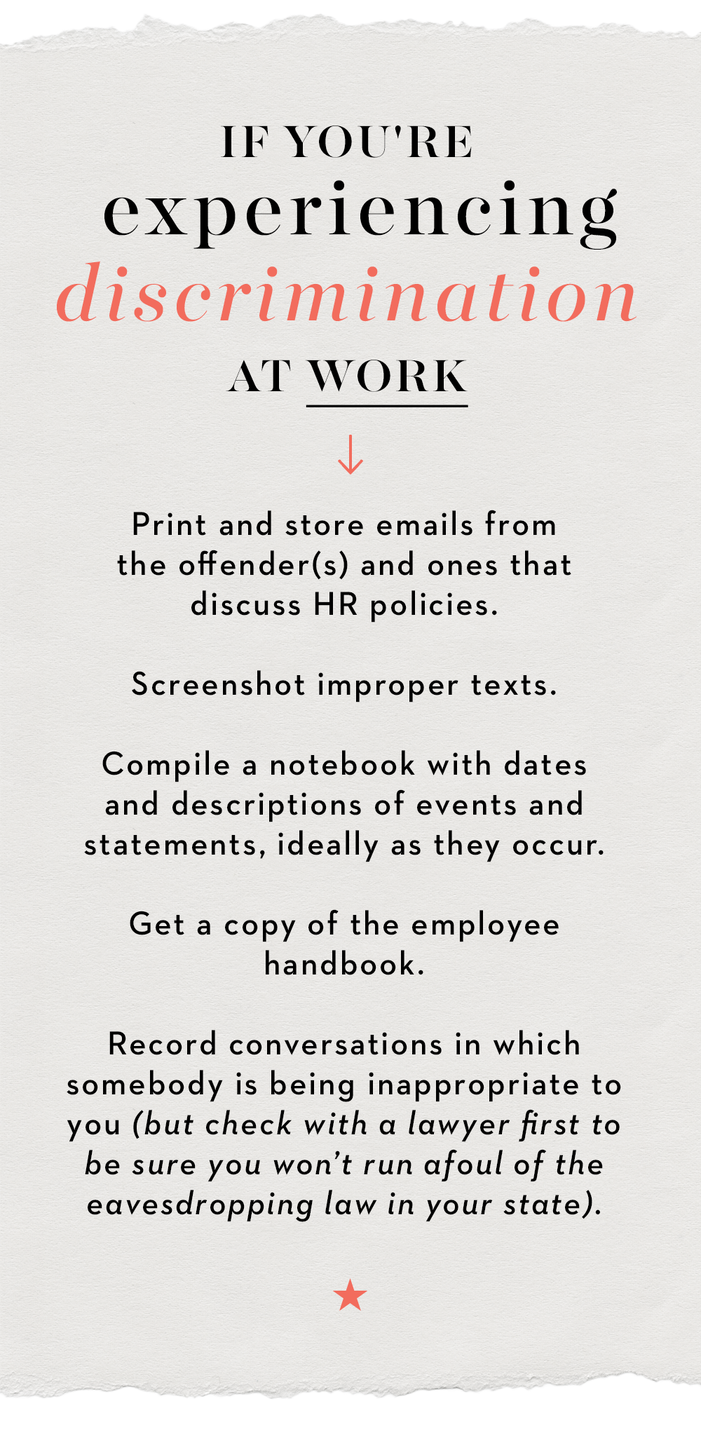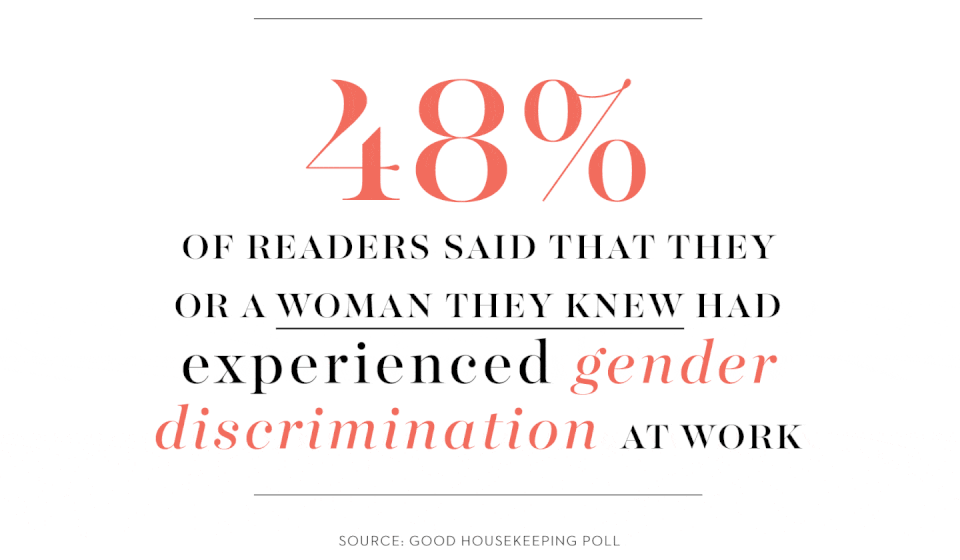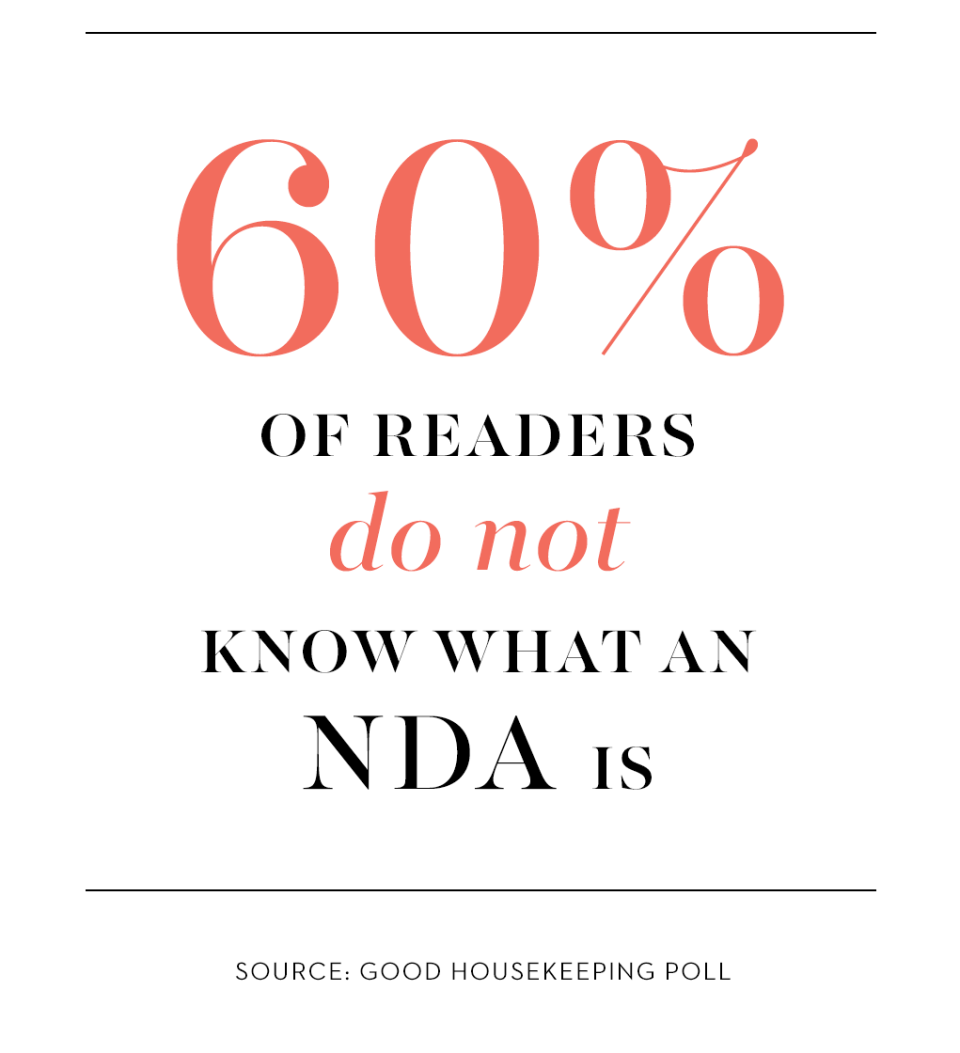An NDA Keeps Me From Telling My Full Story, But It Won't Stop Me From Helping Other Women

Two years ago, Diana Falzone shared her struggle with endometriosis and her fear of missing motherhood with Good Housekeeping. What she couldn't say in our story was that at the same time, she was in a traumatic legal battler with her employer, now she's speaking up to help us all.
"I'm ambitious and I work in a competitive environment: I didn't want to appear vulnerable, so I kept up a strong facade during the day, then went home to cry it out at night."
A lot has changed in the two years since I wrote the above quote about the excruciating pain of endometriosis and the emotional fallout of infertility. The good: Miraculously, I was able to get pregnant, and now have a healthy, beautiful little boy. The bad: Back then I also shared that it was “uncomfortable to explain to your boss as a reason you’ve missed work. But women need to speak up.” What I couldn’t say was that almost a year earlier, not long after I had emergency surgery to save my uterus, I had filed a lawsuit against my then employer, Fox News Channel, for gender and disability discrimination.
The month my Good Housekeeping article hit newsstands was an emotional roller coaster: I was ecstatic to learn that I was pregnant despite having believed it would never happen for me — but also desperately worried that the stress of my legal battle would harm my unborn child. I decided for my own health and that of my new baby that it was best to settle quickly with the television network. To do that, I was required to sign a nondisclosure agreement. This NDA prohibits me to this day from discussing my work and the details of my lawsuit publicly. I am not allowed to tell you anything about my own work at Fox News. That has kept me from using my full story to help women, and looking back, had I not felt pressure to wrap things up and move on so I could focus on my baby, I might have taken the case to trial.
The truth is, no matter what is happening in your personal life, dealing with workplace discrimination shifts you into high-anxiety mode. Taking the time to make well-thought-out decisions seems impossible. And even when you think you are doing everything right, the odds are stacked against you. The #MeToo movement gathered momentum because publicly outing their harassers was the only recourse women in Hollywood had. Turns out this isn’t just an issue in the entertainment industry: In a Good Housekeeping poll of 5,000 readers, 48% said they or a woman they knew had experienced gender discrimination in the workplace; 46% said the same about sexual harassment.
So I spoke with experts on the topic and got this advice on how women can achieve better outcomes.
Doubting yourself is normal — start documenting anyway.
“It is human nature for a woman who is being abused — whether in the workplace or anywhere — to put herself through several mental exercises before accepting that what is going on is in fact abuse,” says women’s rights attorney Tamara Holder. “A common diversion tactic is attempting to laugh it off. Then we engage in denial. Then there is fear of confronting the abuser or the employer, because what if it is a joke — which it rarely is.”

The bottom line: If something feels even the slightest bit wrong, start keeping a record of the behavior. Discrimination won’t always be a clearly offensive remark. It could be getting subtly denied work opportunities because of gender stereotypes (“a mom won’t want to do business travel”) or being iced out of meetings in favor of male peers. The sooner you start tracking questionable conduct, the sooner you will be able to come to terms with the fact that the behavior is wrong — and you will also be prepared to present your case.
“Preserve any information that might suddenly be inaccessible if you were fired,” she recommends. “Make sure you get possession of the company handbook. Make copies of emails that discuss HR policies and from the person or people you believe discriminated against you. A time line written when the harassment is happening is like a diary and can be invaluable.”
One of Holder’s clients was unsure at first what to make of her boss’s behavior. “She was new on the job and thought he was just ‘joking’ with her in an attempt to make her comfortable. It took her a couple of months to come to grips with it and then to start documenting everything in detail. Once she told him to stop, he began to engage in retaliatory tactics,” Holder says. Had the woman not already been tracking the harassment, it might have been too late to gather enough evidence to refute his claims. “It was her saving grace,” Holder adds.
Talk to a lawyer before HR.
So now you have proof. You’re not alone if the obvious next step seems to be taking
it to a higher-up who can resolve the situation. An overwhelming 87% of readers we polled said their human resources departments definitely or maybe would act in their best interests if they were discriminated against at work.
Not so fast, says Alexander W. Leonard, a New York City – based employment lawyer. “Just know and remember that HR is on the employer’s side, regardless of how empathetic the HR person may appear,” he says. Once you file a complaint, the company starts preparing for a potential legal claim, and “anything you said could be twisted, and not in your favor,” says Holder.
An employment lawyer can advise you on what to say, and “it can also be beneficial, from a psychological standpoint, to have someone in your corner when you are dealing with a deeply personal issue all alone,” says Leonard. That’s another thing about going to HR — there is no such thing as a confidential complaint.
“You may be surprised by people who will disbelieve you” when they hear about it in the rumor mill, warns Leonard. “You should be prepared for the possibility that things may deteriorate and force you to seek other employment in the near term. There are ways to mitigate this. Other women who have suffered discrimination at the company can provide support, more so if they are willing to come forward. There is strength in numbers.”

Unfortunately, settling may be your only option…
Nicole was pregnant with her first child when she was terminated from her job as an insurance agent. “I suffered from extreme hyperemesis gravidarum, essentially extreme morning sickness. As a result, I had to visit the ER twice and missed seven and a half days of work over a few months. First my boss started treating me differently and transferred my job duties to someone else. Then he gave me a termination letter that stated that he needed to ‘sever ties’ because he anticipated that I would also miss work after having my baby.”
Her case may seem clear-cut, but not according to the law of Georgia, where she lived. “There are federal laws that cover sex discrimination everywhere,” explains Leonard, “but states have differing definitions as to what is legally actionable.”
Nicole and her former employer were able to reach a settlement. Holder says that many times companies would rather settle, because it costs them less than fighting a public legal battle. “My settlement made me feel vindicated, that he was acknowledging, albeit in a financial way, that what he did was wrong,” says Nicole.
… But there will likely be strings.
There is a dark side to many of these settlement agreements. “I was left with one choice: settle and sign an NDA, or walk away with nothing,” says Nicole. Not surprisingly, 60% of readers polled said that did know what an NDA was.
Some NDAs are in place to protect a company’s trade secrets, while others are used to conceal nefarious behavior like sexual harassment, discrimination, and retaliation. Those NDAs only help perpetuate bad behavior — bad behavior that American women still face in the workplace.

“Employers have for far too long used a very effective strategy: Negotiate a settlement amount, then send the agreement over with the NDA, because most people do not want to walk away from a pile of money,” says Holder. She proposes that settlements be an à la carte package. “How much is the actual violation of law worth to the employer? How much for silence? How much for the woman to resign? I want to make sure my client can move on with her life in a way she feels good about, not as if she got money to stay trapped in a cage.”
There is more help for women than ever before.
Past Good Housekeeping cover star Gretchen Carlson, Julie Roginsky, and I — all former Fox News on-camera talent who had to sign NDAs as part of our network settlements — have teamed up to create a nonprofit called Lift Our Voices. Through educational campaigns, it aims to eradicate NDAs that conceal toxic workplace behavior and fight the silencing of women who have been harassed or discriminated against. (In fact, it was Lift Our Voices that sent letters to the 2020 presidential candidates, asking them publicly condemn nondisclosures that deal with workplace environment issues. So far, Former Vice President Joe Biden, Senator Elizabeth Warren, and Mayor Pete Buttigieg have done so).
“Until we end the culture that silences survivors of sexual harassment, verbal abuse and other toxic behavior, we will seek to be a resource for workers to ensure that they are aware of the real-life consequences of these gag orders,” says Julie, a Democratic strategist.
One of the consequences for Gretchen after her exit from Fox News was not being allowed to contribute to or participate in the making of a movie about her own life. In the Oscar-nominated Bombshell, Nicole Kidman portrays Gretchen during the time she sued the late Fox News chairman Roger Ailes for sexual harassment. “For decades, companies have been able to hide their dirty laundry,” says Gretchen. “Eradicating NDAs is the next step in the cultural revolution, and companies can decide if they want to be on the right side of history or not.”
Another powerful resource is Time’s Up: Started by a group of prominent Hollywood women to fight the rampant harassment in their industry, it has expanded its scope
to support women in any field. “The Time’s Up Legal Defense Fund connects workers facing sexual harassment to attorneys who agree to give a first consultation for free,” says Sharyn Tejani, the organization’s director.
The #MeToo movement may have gained notoriety through high-profile women, but not having a platform or a big paycheck shouldn’t prevent you from standing up for yourself. “Through my advocacy, I’ve learned that almost every woman has a story,” says Gretchen. “Giving every woman a voice is what will finally resolve this issue.”
This story is originally appeared in the April 2020 issue of Good Housekeeping.
You Might Also Like

